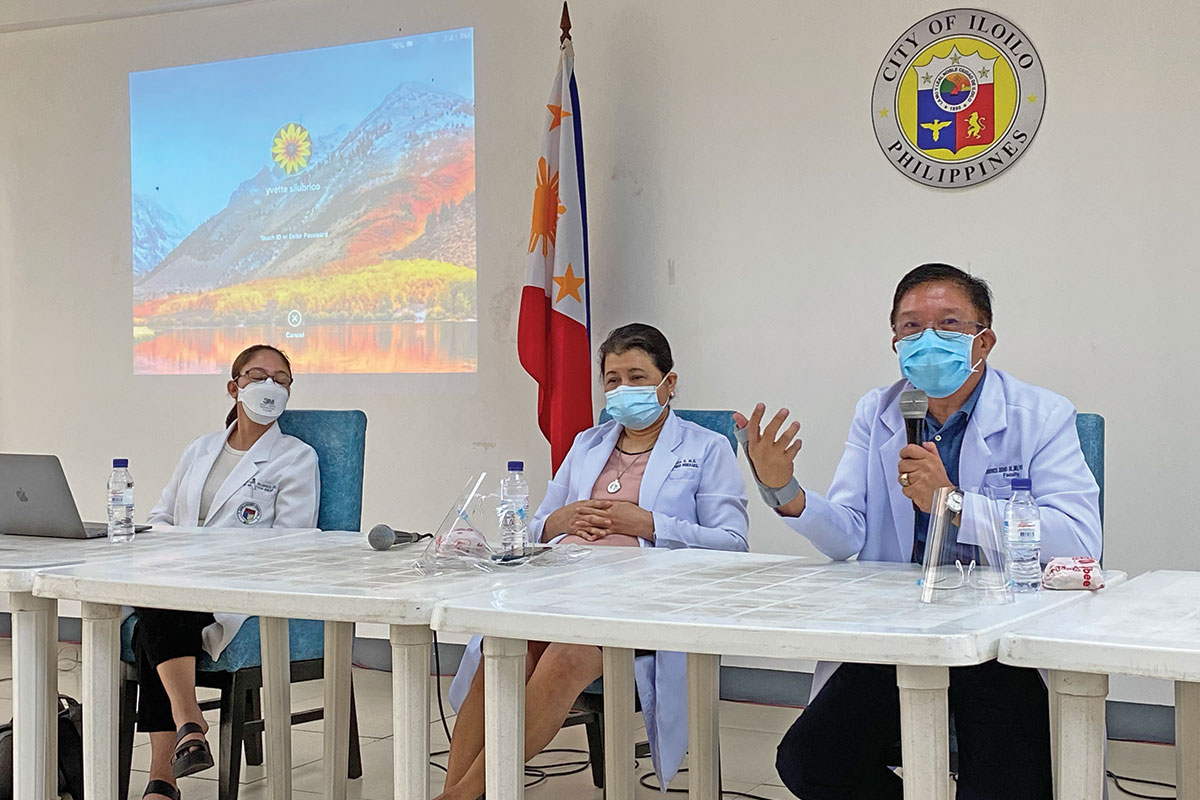
By Joseph B.A. Marzan
Local infectious disease experts in Iloilo City encouraged the public to vaccinate themselves against the coronavirus disease 2019 (Covid-19) when it arrives in the city later this year.
The Iloilo City Government and the Western Visayas Chapter of the Philippine Society for Microbiology and Infectious Diseases (PSMID) held a media forum on Thursday to discuss basic information about vaccines and the importance of being vaccinated.
Present during the forum were Dr. Ella Mae Divinagracia and Dr. Ludivico Jurao Jr., who had been part of the team of doctors advising Iloilo City Mayor Jerry Treñas; and Dr. Yvette Silubrico, Vice President of the PSMID Western Visayas Chapter.
Dr. Silubrico reported that the current threshold to achieve “herd immunity” against Covid-19 was around two-thirds or 67% of the population.
Herd immunity is a concept that has been used by leaders in countries in like Sweden and the United Kingdom, particularly to avoid wearing masks and instituting Covid-related lockdowns.
But the term, also synonymous with “acquired immunity”, referred to “indirect protection from infection” according to Silubrico.
There are two ways to achieve herd immunity: the first being natural infection with a pathogen, and second being immunization with a vaccine.
Currently, there are many vaccines being developed against Covid-19 worldwide, but here in the Philippines, temporary Emergency-Use Authorizations (EUA) have been granted to only two vaccines.
EUA’s have been issued to BnT162b2 made by German biotechnology company BioNTech and distributed globally by American pharmaceutical company Pfizer; and AZD1222, which is produced and distributed by British-Swedish pharmaceutical company AstraZeneca.
Both the city and province of Iloilo have already signed deals to acquire AZD1222 vials back in January.
DOCS WERE HESITANT BUT…
During the forum, Dr. Divinagracia admitted that she was also hesitant to have herself vaccinated against Covid-19 back then, but now said that she hopes to encourage the public to have themselves vaccinated.
“We know the percent of the people in our population who are [hesitant] to vaccinate at this point in time, so we hope to explain to them. If you asked me during June or July, if I would be vaccinated, my answer would have been no. The vaccines were carefully studied. As infectious diseases specialists, we saw the patients who were infected and taken to the hospital. Seeing these patients, we can say that if the vaccine is there, it can protect us. Those who doubt, or are not sure, we hope we can increase their understanding and confidence so our usage of the vaccine can increase,” Divinagracia said.
Dr. Jurao said he believes that public hesitancy over Covid-19 vaccines was due to previous reports on the side effects of the vaccines on other diseases.
Jurao also mentioned that he volunteered to be the first at the Iloilo Doctors Hospital, where he heads the infection control department, to be inoculated against Covid-19, to “inspire confidence” among hospital personnel.
“The hesitancy of the people to have themselves injected is because the adverse reactions to vaccines are being magnified. We’re not saying that vaccines do not have side effects. All vaccines have side effects, but if you expound a ‘severe reaction’, how many of these ‘severe reactions’ have occurred compared to the number of people who have died because they had not been vaccinated?” Jurao said.
As to the “temporary” and “waning” effectivity of vaccines against Covid-19, he pointed to the effectivity of vaccines against influenza in the early 20th century, which he said may possibly have the same effect as Covid in needing only one vaccination process.
“The argument there can be answered by the fact that a yearly influenza vaccine was being pushed. Influenza was a pandemic a little more than 100 years ago. It also killed so many people, and then the vaccination process went into effect. We are now just living with influenza. So is it possible that Covid-19 may behave like influenza? It’s possible, which means that we might not get a lifetime of immunity, but it will reduce our risk of dying from an infectious disease like Covid, and we can also protect our loved ones in the community from transmission, especially our family members,” explained Jurao.
Divinagracia added that infectious disease experts have a “great task” in explaining the importance of immunization to the public, including healthcare personnel who are also hesitant.
“Our role here is significant to help people understand. As I’ve said early on, if we weren’t clarified on the vaccines being developed, then of course we would also be doubtful. But now, there are many studies, and it’s also good that we are not ahead. There have been millions immunized, and we’ve seen that there haven’t been any [positive] effects. Let’s just assure the public. There will be effects on the body, but that’s temporary,” she said.
This forum is part of the city government’s greater push to have residents and workers vaccinated, even after a lackluster showing in its survey on vaccine acceptance and hesitancy.
The survey’s results, which were publicized by the city government earlier this week, showed that only 10 to 30 percent of city residents were completely willing to undergo Covid-19 vaccination.























